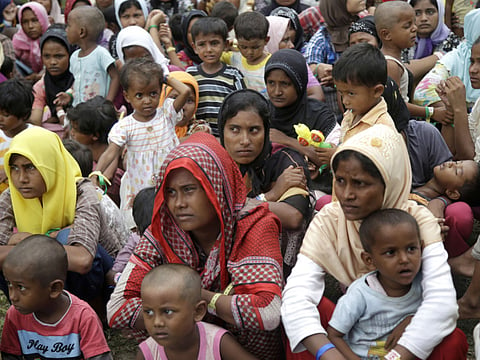At 60 million, world has more refugees today than ever
There are more refugee and displaced people around the world now than at any other time since the end of the Second World War

Dubai: Wars, conflicts and persecution are forcing a record number of people to flee their homes.
Nearly 60 million people were displaced in 2014, according to a United Nations report that was released today.
The World at War, compiled and released by the United Nations High Commissioner for Refugees (UNHCR), said that 59.5 million people were forcibly displaced at the end of 2014. That compared with 51.2 million displaced people a year earlier, and 37.5 million a decade ago.
Putting it into context, imagine if every man, woman and child living in the six Gulf Cooperation Council countries of Saudi Arabia, Oman, Kuwait, Bahrain, Qatar and the UAE were displaced; or every single English, Welsh, Scottish and Irish person that lived on the British Isles were forced to live elsewhere.
Highest ever
“The increase since 2013 was the highest ever seen in a single year,” the UNHCR report said. “Worldwide, one in every 122 humans is now either a refugee, internally displaced, or seeking asylum. Were this population of a country, it would be the world’s 24th biggest,” it noted.
“We received these figures with deep sadness,” said UNHCR spokesperson Mohammad Abouasaker.
“Instead of solving the problems [that are causing these human tragedies], the numbers [of displaced and refugees] are increasingly breaking records,” he told Gulf News in an interview. And the problem of tens of millions of refugees and displaced people globally is “a threat to international safety and security,” he said. “It is a beyond one country’s problem and so many countries get affected.”
While wars and conflicts are to blame for the human tragedy, Abouasaker added that “financial and humanitarian aid don’t solve their problem. The problem is that there is no political will to solve the crisis around the world politically.”
“Financial and humanitarian aid is just to keep the refugees alive,” he said. “This is not a solution to the problem.”
Still, donations don’t match the needs of those refugees and displaced on the ground, Abouasaker said.
The UN High Commissioner for Refugees, Antonio Guterres, noted in the report that “it is terrifying that, on the one hand, there is more and more impunity for those starting conflicts, and on the other, there is the seeming utter inability of the international community to work together to stop wars and build and preserve peace.”
Last year alone, 13.9 million became newly displaced – four times the number in 2010, the UNHCR report said.
Worldwide there were 19.5 million refugees — up from 16.7 million in 2013. More than 38 million were displaced inside their own countries — up from 33.3 million in 2013.
And 1.8 million people were awaiting the outcome of claims for asylum in 2014, compared to 1.2 million in 2013. Alarmingly, over half the world’s refugees are children, the UNHCR added.
Syria is the world’s biggest producer of both internally displaced people, with nearly 7.6 million displaced and 3.88 million refugees at the end of 2014. It is followed by Afghanistan with 2.59 million refugees and Somalia with 1.1 million refugees.
15 fresh conflicts
The report notes that in the past five years, at least 15 conflicts have erupted or reignited: Eight in Africa — Cote d’Ivoire, Central African Republic, Libya, Mali, north eastern Nigeria, Democratic Republic of the Congo, South Sudan and this year in Burundi; three in the Middle East — Syria, Iraq, and Yemen; one in Europe — Ukraine; and three in Asia — Kyrgyzstan, and in several areas of Myanmar and Pakistan). Few of these crises have been resolved and most still generate new displacements of people.
In 2014 just 126,800 refugees were able to return to their home countries, the lowest number in 31 years, the UNHCR said.
Sign up for the Daily Briefing
Get the latest news and updates straight to your inbox



